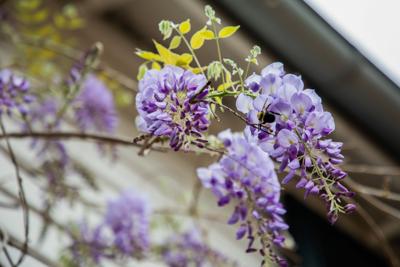As spring announces itself with blankets of pollen on every surface in sight, plants are blooming and the birds are chirping. Despite steady population decline due to invasive plant and animal species, pollinators are also coming back out of the woodwork to do their jobs.
Although spring blooms and lively plants may be beautiful, some of them can disrupt the native bee population. For example, privet, the invasive plant species that makes up the famous Sanford Stadium hedges, is harmful to wild native bee populations. It chokes native plants in the environment, said Jennifer Berry, research professional and lab manager for the University of Georgia Honey Bee Program.
Berry said native bee populations have evolved with specific plants and can be picky about what they pollinate. Therefore, if native plants are lost to privet growth, those bees are left without food, even if there’s a large number of plants blooming.
Although invasive plants aren’t helpful, the main reason why native bee populations decline is a man-made problem.
“We don’t have the habitat like we used to, obviously, because we’re building Dollar Generals everywhere,” Berry said.
Native bees aren’t huge contributors to agriculture because their numbers in the wild are relatively low. However, they play a large role in biodiversity. Berry said there’s no way to know what would happen if native bee populations went extinct. There’s a risk of losing the plants those bees pollinate and any species hosted by those plants because of interconnectivity in the environment.
When it comes to agriculture, honeybees are the real stars. Their pollination contributes roughly $15 billion in “added crop value,” according to the U.S. Food and Drug Administration.
Honeybees themselves aren’t native, but they do more good than harm to the environment, said Mike Dayton, former president of the Northeast Georgia Mountain Beekeepers Association.
Humans introduce non-native species to habitats where they weren’t found before. Non-native species also typically cannot reproduce or spread quickly without human help. Invasive species are non-native species that can establish in many habitats. They spread quickly enough to disrupt habitats and ecosystems, according to the U.S. Department of Agriculture.
The biggest threat to honeybees is an invasive species called the varroa destructor, which is a parasitic mite that came to the U.S. from Asia. It’s a threat because the mite evolved with Asian honeybees rather than the European bees used in America. Therefore, the bees don’t have any protection against the mite, Berry said.
According to a loss and management survey by nonprofit Bee Informed, backyard beekeepers lose 41% of their bees per year. Dayton said he would expect about 20-30% of those losses to be the work of varroa mites. Despite the losses, beekeepers must keep up their work to replenish the populations lost.
“Beekeepers are sort of like a marathon[er] who’s wearing weights around their ankles,” Dayton said.
A decline in honeybee populations is a big issue affecting biodiversity and food supply. Without honeybees, there would be no fruits, vegetables or other produce reliant on pollination. The only crops left would be those pollinated by wind, Dayton said.
Although not everyone can become a beekeeper, Berry said there are other ways to help the bee population. She recommends buying local honey and supporting local beekeeping groups. Homeowners, and some apartment renters, can plant native vegetation or plant clover in place of grass lawns.
“Will we as a human species starve if native bees go extinct? Probably not,” Berry said. “But what kind of world would we live in? The diversity is what makes this planet unique.”
For local honey, check out shops like Classic City Bee Company on the East Side and Bear Hug Honey Company downtown. Options include raw honey, wildflower varieties, infused flavors like blueberry and smoked honey, health and beauty products and gift boxes. Local honey can also be purchased from smaller vendors at Athens’ various farmers markets.

